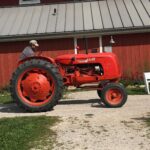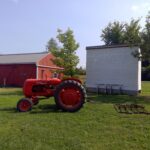By Gabe Ross, Farm Manager

The newest addition to Gallant farm this year is a Co-op E3 tractor. Co-op tractors prior to World War II were made by a variety of manufacturers throughout the US, with most using Chrysler engines. These affordable tractors were sold through farm cooperatives. After the war, the Canadian company Cockshutt was trying to get a foothold in the United States tractor market. They were awarded the contract to sell rebranded Cockshutt tactors in the US as Co-ops. The Co-op E3 is the exact same tractor as the Cockshutt 30, just a different color.
This Co-op E3’s claim to fame is that it was the first tractor to have a live power take off, also known as a live PTO. The PTO is a splined shaft that comes out of the back of most tractors. It can be connected to implements like hay balers, pull type combines, feed grinders, and a variety of mowers to power them from the engine of the tractor. Prior to the Co-op E3 tractor, PTOs stopped spinning when the clutch was depressed, meaning that if you were in motion the PTO could run, but if you stopped the PTO would stop.
This is okay for some things but presents problems for others. If you are combining heavy oats or wheat and the combine is overloaded, it will shut off and plug up if you stop. With a live PTO you can push the clutch in stopping the forward motion of the tractor and the PTO will keep running. This allows the machine to clear the heavy load without adding more straw and grain to plug it more. This is also useful for hay balers and some other implements. Allis Chalmers had a similar system, but it involved two clutches. A hand clutch stopped the forward motion and a foot clutch stopped the PTO and forward motion. The E3 was the first to have true live PTO.

The Co-op brand name was last used in 1958 and since then Cockshutt tractors have also gone by the wayside. Fortunately, most parts are still available and the E3 tractor will keep providing power for many years to come. This fall it was used on the farm to disc, harrow and plant five acres of wheat, rye, and oats. Come out to Gallant Farm, Thursday through Sunday 12pm – 5pm September through April, and take a look at this important milestone in agricultural history.






